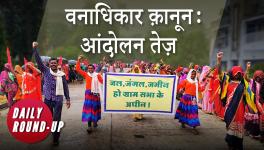Study Reveals Death Toll From Hurricane Maria was 70 Times Higher Than Official Estimate

Image Coutesy: IFL science
A new Harvard study has estimated that at least 4,645 deaths could be linked to Hurricane Maria and its aftermath in Puerto Rico in late 2017. This number is 70 times higher than the official death toll of 64, a number which activists and communities have consistently refuted. Activists have also consistently highlighted the human toll of the infrastructure damage, the government’s inability to respond to the needs of their citizens, and the United States government’s inhibition of any sort of true recovery efforts. These include blocking a Cuban delegation of electricians who wanted to help repair the electrical grid, blocking the arrival of supplies and not forgiving the debt and continuing to force Puerto Rico to carry out neoliberal austerity reforms
The Dawn News spoke to Jocelyn Velazquez Rodriguez, spokesperson of Jornada Se Acabaron Las Promesas, in May, who had pointed out “Currently, there are thousands and thousands of families that for 9 months have not had access to water or electricity services. We have dozens of houses without roofs, because they do not have the money to rebuild their homes. The biggest worry we have right now is that we are very close to the beginning of hurricane season and the country has still not recovered enough to be able to handle any sort of atmospheric phenomenon even less severe than what we saw last year. There are still people dying because of the lack of electricity and lack of water, and the government continues to hide the real statistics of deaths and it continues to hide the reality that for many sectors of the country, it feels like the hurricane happened yesterday. Every day, the recovery process becomes harder.”
The costs of the damage were high. It is estimated that the hurricane caused around $90 billion in infrastructure damage in Puerto Rico. At least 3 million citizens were left without electricity, water, telecommunications and access to medical care.
The study was carried out for the period between September 20, 2017 and December 31, 2017. The survey involved 3,299 randomly chosen households and the respondents were asked about the displacement, infrastructure loss, and cause of death. The results of this survey were then compared to official mortality statistics of 2016. That helped them calculate the excess deaths by comparing the mortality rate in their survey to the official mortality rates in the same time period in 2016. They found a 62% increase in the mortality rate as compared to the same period in 2016.
This study points to the abject failure and complete disregard of the US administration and the Federal Disaster relief agencies towards the people of Puerto Rico. Not only did they understate the number of deaths and try to downplay them, they also did not provide emergency medical assistance and other basic services on time. This resulted in many deaths which could have otherwise been prevented by prompt action by the authorities.
The survey found that the significant increase in deaths in the months after Hurricane Maria was mainly a result of interruption of medical care, with about one-third of households reporting issues such as lack of medication (14.4%), being unable to use respiratory equipment because of lack of electricity (9.5%), having no open medical facilities nearby (8.6%) and having no doctors at medical facilities (6.1%).
As Velazquez pointed out, these conditions still persist, as many people in Puerto Rico have still not had their electricity or water services restored, eight months after the hurricane.
The release of the study sparked an immediate response from civil society and social movements. Following the announcement of the almost 5,000 excessive deaths, family members and community members took to the public plazas and brought pairs of shoes of their deceased loved ones to convey what this study truly meant, and to make the point that these were not mere numbers but people.
An alternative media website in Puerto Rico, Centro de Periodismo Investigativo, launched an initiative online to create a database and source numbers from the society of the number of deaths caused by the Hurricane. The Puerto Rican people are insisting that the government cannot hide behind the lie of 64 deaths anymore, and that it must take responsibility to repair the damage caused by the hurricane, especially since the hurricane season is about to begin again.
Get the latest reports & analysis with people's perspective on Protests, movements & deep analytical videos, discussions of the current affairs in your Telegram app. Subscribe to NewsClick's Telegram channel & get Real-Time updates on stories, as they get published on our website.
























